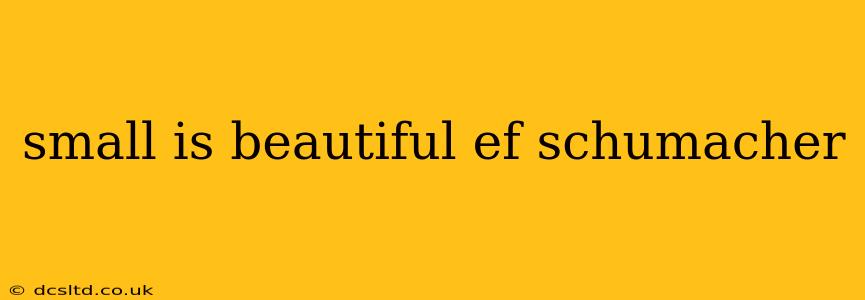E.F. Schumacher's Small Is Beautiful: Economics as if People Mattered isn't just a book; it's a manifesto. Published in 1973, its message resonates even more powerfully today as we grapple with climate change, economic inequality, and the limitations of our current growth-obsessed paradigm. Schumacher, a renowned economist, challenged the conventional wisdom of his time, advocating for a more human-centered approach to economics that prioritized sustainability, community, and individual well-being over relentless expansion. This exploration delves into the core tenets of Schumacher's philosophy and its continued relevance in the 21st century.
What is the main argument of Small is Beautiful?
Schumacher's central argument is a critique of what he terms "giganticism"—the relentless pursuit of growth for its own sake, often at the expense of human values and environmental health. He posited that this approach, deeply embedded in conventional economic theory, is fundamentally flawed. It ignores the limits of natural resources, fosters social inequality, and ultimately undermines human happiness. Instead, he proposed a shift towards "intermediate technology"—appropriate technology suited to local contexts and human scale, promoting self-reliance and sustainability. This is not simply a rejection of technology, but a call for its responsible and mindful application.
What are the key ideas in Small Is Beautiful?
Several key ideas underpin Schumacher's philosophy:
-
Appropriate Technology: Schumacher championed technologies that are accessible, affordable, and environmentally sound, emphasizing their suitability for specific needs and contexts. This contrasts with the often-destructive and resource-intensive technologies favored by large corporations.
-
Buddhist Economics: Drawing on Buddhist principles, Schumacher highlighted the importance of work as a source of meaning and purpose, rather than solely as a means to material wealth. He criticized the relentless pursuit of economic growth, arguing it often leads to dissatisfaction and alienation.
-
Limits to Growth: Schumacher acknowledged the inherent limitations of natural resources and the environmental consequences of unchecked economic expansion. He advocated for a more mindful and sustainable approach to resource management.
-
Decentralization and Local Self-Reliance: He argued for empowering local communities and fostering self-sufficiency to reduce dependence on large, centralized systems. This approach promotes greater resilience and responsiveness to local needs.
What are the criticisms of Small Is Beautiful?
While Small Is Beautiful has been widely praised for its insightful critique of conventional economics, it has also faced criticism. Some argue that Schumacher's vision is overly idealistic and impractical, failing to account for the complexities of global economics and technological innovation. Others criticize his reliance on certain interpretations of Buddhist economics, arguing they may not be universally applicable.
What are some examples of intermediate technology?
Schumacher's concept of intermediate technology is best illustrated through practical examples. Consider:
-
Solar energy for rural electrification: Replacing expensive and polluting grid connections with locally-maintained solar power systems provides a sustainable and accessible alternative.
-
Water harvesting techniques: Simple, low-cost techniques for collecting and storing rainwater can provide essential water resources in arid and semi-arid regions.
-
Appropriate agricultural tools: Small-scale farming practices using locally-made tools are more sustainable and less reliant on expensive inputs compared to large-scale, industrialized agriculture.
How is Small Is Beautiful relevant today?
Schumacher's insights remain profoundly relevant in the 21st century. Our current environmental challenges, including climate change and resource depletion, underscore the urgency of his message. The growing inequalities of wealth and the limitations of a growth-obsessed economy further validate his critique. His emphasis on local self-reliance, sustainable technologies, and a more human-centered approach to economics offers a valuable pathway towards a more just and sustainable future.
Is Small Is Beautiful still relevant today?
Absolutely. The core principles of Small Is Beautiful – sustainability, community, and human well-being – are more pertinent than ever in the face of escalating environmental crises and social inequalities. The book continues to inspire movements advocating for ecological responsibility, localized economies, and alternative development models.
In conclusion, Small Is Beautiful is not merely a historical text; it is a timeless call for a more thoughtful and responsible approach to economic development. Its enduring relevance lies in its unwavering focus on human values, environmental sustainability, and the pursuit of a truly thriving society.
